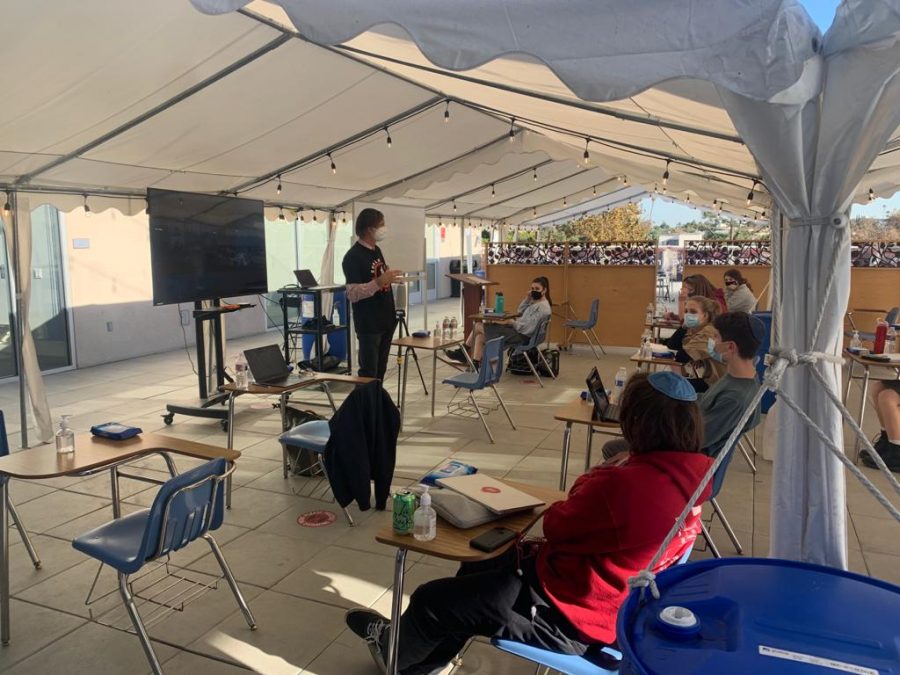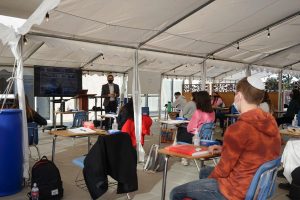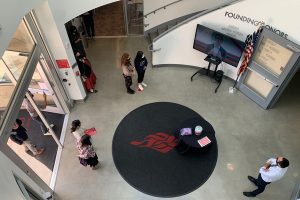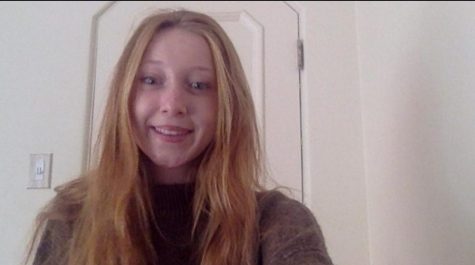Medical Task Force works to steer school through changing Covid pandemic
Team of parents who are also doctors — two with county Health Department — has guided administrators since March
LIVE: Rabbi Abraham Lieberman taught 10th-grade Modern Jewish History Dec. 3 in the Sarah tent on the third-floor patio. According to a Nov. 27 Los Angeles “Health Officer Order,” schools and day camps can remain open while following health protocols. Shalhevet has been having one grade per day meet iat school since Dec. 1.
December 17, 2020
When Sarah Emerson, Shalhevet’s Chief Operating Officer, first came to the school four years ago, she never imagined that fending off a deadly disease would be part of her job description.
At that time, her title was Executive Director. Two-plus years ago, it was changed to COO, or Chief Operating Officer — just in time.
Schools all around the country had to quickly reassess in-person learning and safety when Covid hit last March. At Shalhevet, that meant completely reevaluating how school operates, and Sarah Emerson became the one tasked with this job.
“Rolling with the punches, taking everything day by day,” is how Ms. Emerson described what she’s been doing since then, saying that is what works best in times of uncertainty. In her current role, she’s overseen everything from making plexiglass desk dividers to evaluating air flow in different classrooms.
And for medical decisions — including when and how to allow students back at school — she established an official Medical Task Force, composed of doctors, administrators and the school’s board president, also a doctor, who would make all major Covid-related decisions during these unprecedented times.
“We quickly realized that we needed some help navigating what was becoming the Covid 19 crisis,” Ms. Emerson told the Boiling Point in September.
The Shalhevet Medical Task Force is led by Dr. Zach Rubin and Dr. Julie Higashi, both Shalhevet parents who are also infectious disease specialists at the Los Angeles County Department of Public Health. Dr. Higashi heads the county’s tuberculosis control efforts, while Dr. Rubin served as chairperson of the Healthcare Outreach Unit, established in 2003 to monitor the outbreak of SARS — a virus from the same family as Covid-19.
Dr. Rubin is the father of seniors Yael and Akiva Rubin, and Dr. Higashi is the mother of freshman Tomomi Shaw, as well as alumni Seiji ‘19 and Kiku Shaw ‘20.
Also on the committee from the start has been Dr. Noam Drazin, an oncologist on staff at Cedars-Sinai Medical Center who is president of Shalhevet’s board. He is also father to junior Marlee Drazin and alumni Jennie ‘14 and Lily Drazin ‘19.
Head of School Rabbi Ari Segal, Associate Head of School Rabbi David Block, and Principal Mr. Daniel Weslow are also on the Task Force as administrators of the school, as is Ms. Emerson.
This group put Shalhevet’s first Covid protocols into place. To the community, it became best known for community webinars about how the pandemic was unfolding, and later for its email updates, advisories and advice.
Its first major decision was to shut down in-person learning in March.
“We really tried to keep the school open as long as we could while maintaining a safe environment and working within accepted public health protocols,” Mrs. Emerson said. “We ultimately made a decision with this Task Force to shut down school physically and to move online.”
After that there were not many decisions needing to be made, as there was no in-person interaction. So the Task Force was mostly dormant until mid-July, she said, when it began to consider reopening the school. It also compiled a FAQ sheet and an education and safety plan that was made available to parents and students on the Shalhevet website.
Steps were taken to make room for social distancing, by repurposing the teacher’s work room and other spaces, breaking down walls between classrooms, and adding plexiglass partitions around each desk to reduce air flow between students.
In addition, Ms. Emerson arranged detailed air flow analysis to determine which spaces were well ventilated, and installed new air filters to reduce the flow of possibly infectious particles.
By the middle of summer, Ms. Emerson began preparing for the pandemic pandemonium that the 2020-21 school year might bring.
First, Shalhevet administration decided to host pilot optional in-person enrichment classes in June and July — the first time students had been on-campus since March — with the Task Force’s approval.
It turned out to be a test run for fall. Ms. Emerson said there were no new cases of Covid among the enrichment students, so the Task Force decided to move forward with what it dubbed “Camp Firehawks.” Using the state’s permission for day camps to operate, Camp Firehawks has offered after-school co-curricular activities since September.
Then — after a delay caused by a spike in local infections in November — actual Judaic Studies classes opened on campus, one grade at a time, on Dec. 2. Since that time, the daily countywide case rate has risen from 5,987 (Dec. 2) to 22,422, (Dec. 16). Media reports said one in every 80 residents was experiencing active infections, the Health Department said.
But Shalhevet has remained open.
“Although numbers remain high in Los Angeles, our Medical Task Force continues to feel quite comfortable with continuing our on-campus education this coming week with all the same safety measures and procedures that we’ve already adopted,” stated an administration email sent Dec. 6.
That is exactly what Dr. Drazin, the board president, sees as the Task Force’s role.
“It is really to provide the administration with the medical and scientific support to allow the school to operate in this environment safely,” Dr. Drazin said.
With campus adapted to pandemic protocols and now open, the Task Force mainly functions to “address any questions that come up on a daily basis,” Dr. Drazin said — from how to organize on-campus programming to what to do if someone is exposed to Covid-19.
He said the members work collaboratively, rather than having individual roles, and that decisions are made with state and county Covid-19 safety guidelines in mind.
“The guidelines are pretty straightforward, but when there’s some complexity we get involved,” Dr. Drazin said. “If there’s a difference of opinion in decisions being made, we go to an informal voting process” — that is, they meet over Zoom.
At one such meeting, on Nov. 15 the group made a last-minute decision to cancel reopening of on-campus classes that had been set for two days later.
The Medical Task Force also added a second Covid-oriented committee, this one called the Shalhevet Health Team, which conducts contact tracing and checks in with students about potential virus exposure, officials said.
School guidance counselor Ms. Ester R’bibo is one of the team’s members, offering her perspective on the pandemic’s mental toll on students as well as who’s friends with who.
“The main role of the [health] task force is maintaining people safely being on the school grounds, so taking contact tracing courses and talking to students about possible exposure if that were to come up,” Ms. R’bibo said in an interview.
“Because of the relationship I have with students, if things were to spread I would be able to say, ‘Okay, I kind of know this person is friends with this group of people’ and would be able to see who I might need to reach out to first based on that.”
There was one Shalhevet student who tested positive for Covid-19 (and was asked to quarantine for two weeks), but according to Dr. Drazin that person was not on campus while contagious, so no contact tracing was needed.
But contact tracing may become important later in the year if — as the Task Force anticipates — there are more Covid cases on campus.
So far, things have been running smoothly. While several other Jewish schools have needed to close because of case outbreaks, as of Dec. 16 there has been no outbreak of Covid cases at Shalhevet that would necessitate the school’s shutting down. The county health department defines an outbreak as three or more connected cases.
That doesn’t mean Ms. Emerson’s job has calmed down. Pre-pandemic, she worried about having enough prep time to effectively get ready for Shalhevet meetings and events; now she faces the difficulty of not being able to plan in advance at all, as the pandemic brings so much daily unpredictability.
She said she copes by expecting the unexpected.
“I love solving things,” Ms. Emerson said. “I hear problems and I immediately go into solution mode. I always bring a thorough nature to my job, and so if I’m investigating our insurance plan and I want to be exhaustive in my research, then I’m going to be just as exhaustive in my research for hand sanitizer.”
But as thorough as she is, and as careful and influential as the Medical Task Force may be, none of them are fully in control of what happens with Covid at school.
For example, Dr. Drazin said Camp Firehawks and on-campus learning do present potential Covid spreading danger — but they also can teach students Covid-19 safety etiquette, such as proper mask-wearing technique and social distancing.
“As long as our students are doing that and the communities that they belong to are doing that, then I think we have a very good chance of staying open,” Dr. Drazin said.
“The problem is that there are lots of people that aren’t,” he said. “I live in Beverlywood and I see a number of kids on the street who are not wearing masks and not socially distancing. It doesn’t bode well for a lot of schools that are eventually going to probably end up with significant numbers of cases.”
















